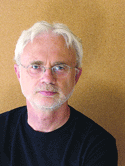An American “Götterdämmerung” courtesy of John Adams and Peter Sellars
While church and state censors frequently watered down or totally eliminated the social and political critiques at the heart of operas by Mozart, Verdi, and other composers of earlier generations, San Francisco Opera and its general director Pamela Rosenberg have given Adams and Sellars the freedom to address the human and moral conflicts seething above and below the surfaces of Los Alamos and Alamogordo, New Mexico. The resulting no-holds-barred spectacle interweaves newly discovered attempts by Manhattan Project scientists to stop the detonation of the bomb with contemporaneous poetry by Muriel Rukeyser and the writings of Baudelaire that Robert Oppenheimer used to secretly communicate with his wife without fear of government interception.
It is no accident that “Doctor Atomic” débuts in the San Francisco opera house erected as a war memorial. At a time when the wake-up calls of Hurricane Katrina, global warming, and bioengineering follow the accelerating devastation of war, AIDS, and cancer, it is time for opera to regain its position as an art form of relevance. As the Universe screams “Stop,” Adams, Sellars and choreographer Lucinda Childs have seized the opportunity to use music and poetry to express the terrifying possibility of the end to “All singing, all dancing” entertainment as we know it.
At a recent San Francisco “Doctor Atomic” press conference, Sellars described opera as an art form that addresses secrets understood and recognized across a whole society.
“Opera is a pregnant art form,” he said, “that includes us all but is larger than any one of us. It is the simultaneous presence of multiple voices, multiple possibilities…”
Adams, who initially resisted the enormous amount of work writing another opera would entail, followed up some initial research by contacting Sellars.
“When Peter came in with his enormous intellect and imagination and started showing me other ways of looking at the story,” said Adams, “I realized, ‘Oh wow, this is the theme for an American opera. There is no other theme.’ It is the “Götterdämmerung” of American culture.
“Oops, I see the headline already. “America’s “Götterdämmerung.” Scratch that.”
Sellars, who is not so easily deterred, seized upon Adams’ Wagnerian analogy:
“John has actually written “Götterdämmerung” for a time when the end of the world is not a mythic image. It is a reality. For Wagner, it could be an archetype. It could come from some pre-dawn. For us, it is the dawn.
“John’s music flows a little faster than Wagner’s because the clock is moving much faster in the 21st century. That intensity of every second, where so much is at stake, is what John spectacularly achieves moment by moment, second by second.”
Enlarging upon the “sound design” technique that he employed in “On the Transmigration of Souls,” Adams has created opera’s overture entirely from prerecorded sounds of power tools.
“I feel when I’m surrounded by it,” he said, “that I’m in one of Ernest Lawrence’s electronic accelerators. Elsewhere, I’ve incorporated some jazz songs from the 1940s to give the sense and texture of the time and place. I would say that my guardian angel is composer Edgar Varèse because, for me, Varèse’s music was the original post-nuclear holocaust sound.”
The opera begins in the Manhattan Project laboratory at Los Alamos, June 1945, and ends with countdown at the Trinity test site at Alamagordo, New Mexico on the morning of July 16. Sellars described the climax:
“In the countdown to the detonation of the bomb, at zero minus one minute, John has written four minutes of music that conveys the time inside of time, where it’s not just as the clock moves, but it’s what’s inside those seconds,” he said. “What is at stake for every one of us every one of those seconds. And when those seconds are marked by a woman’s chorus singing, so you get the human lives inside every second, it takes an abstract image and actually puts it directly into your body clock.”
After the war, Oppenheimer’s passionate arguments against the arms race resulted in public humiliation and FBI surveillance. That story continues with other protagonists to this day.
gaycitynews.com




































